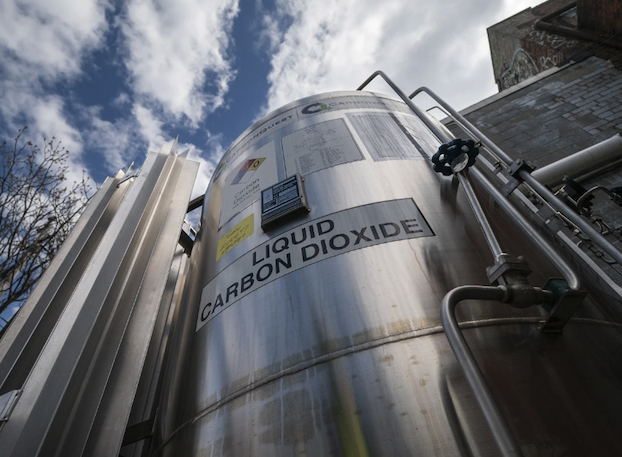ExxonMobil sheds light on its area CO2 projects
Published 7:42 am Saturday, April 26, 2025

- A liquid carbon dioxide containment unit stands outside the fabrication building of Glenwood Mason Supply Company in 2023, in the Brooklyn borough of New York. New York is forcing buildings to clean up, and several are experimenting with capturing carbon dioxide, cooling it into a liquid and mixing it into concrete where it turns into a mineral. (Associated Press)
ExxonMobil is currently in the initial phases of developing carbon capture projects in Allen Parish, including the Hummingbird and Mockingbird projects, which will be situated in the southern part of the parish, to the west and southeast of Oberlin.
“We believe the region around Allen Parish has the right kind of underground rock formations to safely and permanently store CO2 (carbon dioxide),” ExxonMobil’s Carbon Capture, Utilization and Storage (CCUS) Asset Manager Justin Carr said in an email to the American Press.
A public hearing regarding ExxonMobil’s permit application for two exploratory Class V wells in Allen Parish will be held at 6 p.m. Wednesday, April 30 at the Allen Parish Civic Center, 609 Tiger Lane in Oberlin.
According to company officials, the hearing is part of the Louisiana Department of Energy and Natural Resources’ (LDENR) process for collecting technical comments on the proposed exploratory wells.
The format of the hearing will be strictly for technical comments, without any educational presentation, responses to comments, or Q&A session. Each speaker will have two minutes to express technical concerns related to the exploratory wells. Representatives from ExxonMobil will also present a statement during the hearing.
The company plans to capture CO2 emissions from Louisiana businesses and permanently store the CO2 over a mile underground. Carr believes this will help local industries create lower-carbon products, keep Louisiana competitive, create jobs, and boost the state’s economy.
“While CCS has a global impact, the biggest benefits are felt right here at home,” he said. “Our projects will help build up communities through tax revenue, job opportunities and local outreach.”
The benefits to Louisiana include lower-carbon products, tax revenue, job creation and landowner earnings. A typical storage project will result in over $100 million in combined payments to local landowners via lease bonuses, storage fees, and easement payments.
ExxonMobil aims to conduct thorough research to enhance its understanding of the geology and ensure any project in the area adheres to strict environmental and safety standards, according to Carr.
The company has applied for two Class V permits to install exploratory wells in Allen Parish for research and planning purposes. The wells will not be used to store CO2 underground, according to Carr.
If the exploratory wells yield favorable results, separate regulatory Class VI permits will be required to inject and store CO2 at those sites, he said.
The American Press has learned that ExxonMobil has already submitted applications to the LDENR for two underground injection control Class VI permits. The permits cover the construction of wells for the injection and geologic storage of CO2 as part of its Hummingbird sequestration project southeast of Oberlin, near La. 104.
The applications were submitted in advance of the April 30 hearing regarding an initial Class V permit.
“We’ve applied for two Class VI permits in Allen Parish as part of our evaluation of potential CO2 storage sites,” Carr said. “Filing the applications early is a normal step. It helps the LDENR plan their work schedules and prepare staff to review the application.”
The Class Vi permit process is very thorough, and ExxonMobil will provide supplemental information to LDENR throughout the review process, including details from any Class V wells, according to Carr.
To secure a Class VI permit, ExxonMobil is required to submit comprehensive site studies, projections of subsurface CO2 movement, detailed plans for CO2 tracking and leak detection and evidence of project management capabilities for the project’s duration.
The Class VI regulation also mandates proper plugging of abandoned wells. This involves database reviews, site assessments for undocumented wells, and well plugging to Class VI standards for permanent sealing.
The LDENR reviews all applications to ensure compliance and protect underground water sources.
If approved, ExxonMobil will connect the sites to its CO2 pipeline system, which has been safely operating in Louisiana for decades, according to Carr.
Carr also noted that the storage well is situated on a small site, roughly half the size of half a basketball court. The company will use monitoring wells to ensure CO2 remains stored within the designated geological layer.
Carr said the company carefully selects its CO2 storage sites following in-depth analysis to ensure their suitability. The CO2 is stored far underground, secured by thick, sealed rocks, similar to those that have contained oil and natural gas underground for millions of years, he said.
“Once the CO2 is stored, we monitor the sites carefully,” he said. “We use a number of technologies to monitor the wells, including flow measurement, pressure sensing, fiber-optic sensors and 4D seismic technology.”
Additionally, Carr said the CO2 will be stored miles beneath the Earth’s surface, well below any source of drinking water.
“Special Class VI permits are required before any injection to make sure drinking water is protected,” he said. “We can’t get these permits unless the LDENR is confident there will be no impact on drinking water.”
Carr also noted that since the Safe Drinking Water Act of 1972, there hasn’t been a single case of drinking water contamination from permitted underground injection. The latest EPA data indicates that over 740,000 injection wells in the U.S., inject trillions of gallons of fluid, including CO2, without affecting drinking water.
Several customers want ExxonMobil to transport and store CO2 from their sites.
“Right now we have contracts to handle about 14 million metric tons of CO2 each year from across the Gulf Coast,” Carr said. “The CO2 will come from different places, travel through our pipeline system, and be stored at various injection sites along the way.”
Three companies – CF Industries (fertilizer), Nucor (steel) and NH3 (natural gas gathering) – have signed CCS agreements with ExxonMobil.
ExxonMobil currently manages two Enhanced Oil Recovery projects linked to its U.S. Gulf Coast (USGC) system, where CO2 is injected using Class II wells. Louisiana has over 4,000 permitted injection wells.
According to Carr, transporting and storing CO2 is a safe process.
“There are over 5,000 miles of CO2 pipelines in the U.S., and they’ve been operating safely for over 40 years,” he said, noting that pipelines are the safest method for transporting liquids over long distances.”
He further pointed out that Louisiana has more than 50,000 miles of pipelines within the state, with incidents being infrequent regardless of the substance transported.
According to Carr, CO2 pipelines are designed, built, operated, and maintained under the same regulations and requirements as those used for crude oil, jet fuel, propane, and petrochemical pipelines.
Carr stated that the pipeline industry is exceptionally safe. Citing the Liquid Energy Pipeline Association, he noted that CO2 pipelines have a lower incident rate compared to pipelines carrying other products.
Regarding the Satartia, MS, incident Carr explained it was caused by a landslide due to unprecedented rainfall. The landslide exerted extreme force on Denbury’s 24-inch steel pipelines, causing them to rupture. A convergence of rare factors, including temperature, humidity, light winds, land topography, and the time of day, facilitated the CO2’s flow downhill towards Satarita.
“Safety is our top priority,” Carr said. “After ExxonMobil acquired Denbury, we strengthened the pipeline infrastructure and raised safety standards to prevent future problems. We regularly test and maintain our facilities and work closely with local first responders to ensure a quick and coordinated response to any incident.”
The company is also working on new research to make pipelines safer, specifically focusing on proactive geo hazard monitoring and incident prevention. These efforts have supported the creation of new guidelines for managing CO2 pipeline emergencies, which have now become the industry standard, he said.
To further support safety measures, ExxonMobil has developed specialized training programs designed to equip firefighters with the skills necessary to manage pipeline emergencies effectively. The training, which includes both classroom instruction and hands-on exercises, is conducted in partnership with Texas A&M’s Engineering Extension Service (TEEX) at their Baytown Fire Training Field in College Station, Texas. ExxonMobil covers all costs, ensuring that training is accessible at no charge.
To date, nearly 1,000 firefighters have been trained through this program, including 78 from Louisiana.





